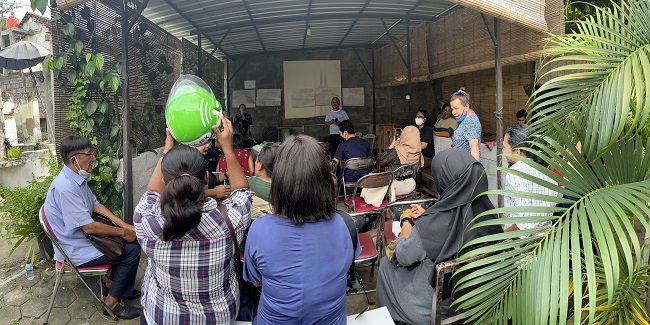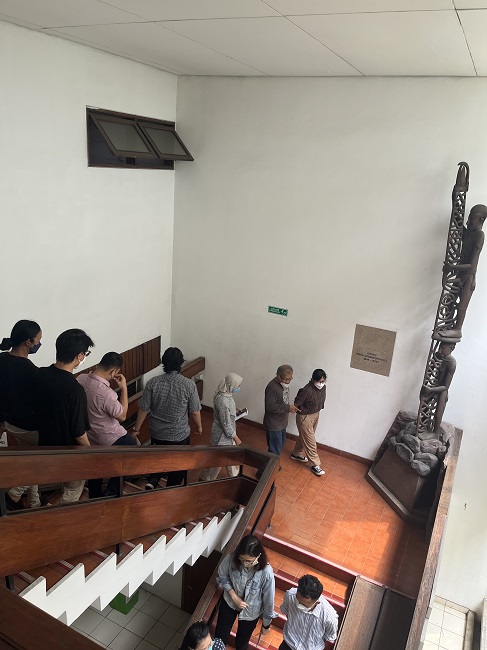Benjamin Hegarty & Annisa R. Beta
Versi Bahasa Indonesia
Ideals of openness and transparency are central to reformasi in Indonesia. A key component of the democratic process is research and education. Universities play a crucial role in conducting research and teaching students to contribute to public debate. As each of the contributors to this edition of Inside Indonesia demonstrates, these have been eroded through the liberalisation of the research sector on the one hand, and an increased tendency towards control and censorship on the other. Broad trends that place limitations on academic freedom are particularly concerning, as are a preoccupation with international standards and uniform metrics developed for the sciences, rather than discipline-based and contextual assessments of quality. The overall erosion of research and teaching as a public good have given rise both to models of research and education.
One of the challenges faced by scholars in, and also those studying Indonesia, is the increasing institutionalisation of research ethics guidelines and funding opportunities through the development of National Research and Innovation Agency (BRIN). The challenges associated with BRIN are faced by Indonesian and foreign researchers alike. BRIN is now Indonesia’s sole national research agency, incorporating the functions of research funding, the management of research institutions, and permission for foreign collaboration and research in Indonesia. While the scale of BRIN provides welcome institutional support for research in Indonesia, a narrowing of research into specific concerns related to the national interest may stifle critical inquiry and limit intellectual freedom.
The scope for BRIN to transform research into a tool of the state is especially concerning given the current political climate in Indonesia, where dissenting voices are often silenced. Along with the reintroduction of limits on researching sensitive topics (albeit on ethical, rather than security grounds), BRIN’s model may inadvertently lead to a narrowing of research topics and unethical and poor-quality forms of collaboration. The Electronic Information and Transactions (ITE) law poses a threat to academic expression by imposing legal limitations on online communication. This law has been used to silence scholars who have criticised the government or other powerful institutions, including Saiful Mahdi, a contributor to this edition. It is important to note that the ITE law does not only stifle academic freedom but also undermines the credibility and legitimacy of knowledge produced under such restrictions.

Other threats to Indonesian research and teaching come from the imposition of onerous bureaucratic requirements and precarious working conditions. The recent release of Ministerial Regulation (Permenpan dan RB) No. 1/2023 on Administrative Reform and Bureaucratic Reform has added further layers of bureaucracy to the already burdensome process of academic accreditation in Indonesian universities. Sulistyowati Irianto, a legal anthropologist, aptly suggests that this will only turn ‘lecturers into bureaucrats’. While this is not an issue limited to Indonesia and reflects a global trend towards audit culture, it is a bleak observation of the future of Indonesian teaching and research.
The production and dissemination of knowledge in Indonesia are not neutral but are shaped by their political and economic context. To imagine a more ethical, equitable, and just research landscape, it is essential to actively challenge the limitations imposed by institutions and infrastructures and to create alternative paradigms and platforms. Indonesians are responding in diverse ways to the challenges of open research at a moment of growing corporate interests and state control over research and education. This edition highlights both the vibrant alternative forms of knowledge production to traditional universities, and critical responses to the threats to the autonomy of Indonesian researchers.
Etnografi terbuka as alternative model for knowledge production
Throughout Asia, activists and scholars have questioned dominant frameworks governing how education and research take place, against the historical backdrop of colonisation, imperialism, and the Cold War. In Indonesia, university campuses have long served as a charged site for linking everyday issues to political aspiration. Out of this distinctive history, as well as recent contributions of civil society to forms of research and education outside of state control, we have developed an alternative knowledge paradigm that we call ‘etnografi terbuka’ or open ethnography.
Etnografi terbuka is a concept that seeks to address the structural inequalities which shape the research landscape in Indonesia. Here, ‘terbuka’ is not in reference to the dichotomy of open or closed, but rather denotes a temporary and context-dependent state of openness, through which we can re-examine the ethics of knowledge production. Such a framework, developed from within the Indonesian context, offers a critical lens on research ethics across all aspects of producing and sharing knowledge. What voices are elevated where others remained silenced? How do Indonesian researchers contribute to global debates, if what is ‘global’ is narrowly perceived as Euro-American (and sometimes Australian) forums? In what ways do we avoid reproducing historical forms of research where Indonesians merely serve as ‘assistants’ to foreign researchers? While ethnography is historically a method associated with anthropology, involving the participation of the researcher in everyday cultural practices to obtain ‘insider knowledge’, etnografi terbuka challenges asymmetries across all research infrastructures.

Institutional solutions to address disparities, produced by colonial legacies and capitalist systems, include a move to (paid) open access publications and an insistence on co-authorship. BRIN’s foreign research permit scheme requires the participation of Indonesian counterparts in the research process. Yet these institutional interventions only scratch the surface of the problem. Our concept of etnografi terbuka and its network, Jaringan Etnografi Terbuka, go further, looking for examples to disrupt exploitative and capitalist models of knowledge and interrogating how research can itself perpetuate inequality.
Common critiques emerging from the humanities insist, rightly, on forms of positionality which situate the researcher as one way to unsettle colonial and gendered forms of knowledge production. Extending these important interventions, etnografi terbuka moves beyond a focus on the individual researcher and their identity, instead thinking about relations: between the researcher, their subjects, and the publics who are engaged in the research. This involves asking fundamental and far-reaching questions about the purpose and audience of research, as well as how data is collected and theorised. By taking a more comprehensive approach to knowledge production, etnografi terbuka challenges researchers to think beyond access and representation and to critically examine the power dynamics at play in the research process.
Etnografi terbuka offers an alternative epistemological framework that prompts scholars to critically examine the unequal terrain of the global research economy and Indonesia’s place in it. This is crucial given that Indonesian scholars have long been at a disadvantage in this regard: due to language barriers, lack of research support and minimal incomes. By fostering a more equitable research landscape, etnografi terbuka offers an alternative to the dominant knowledge production structures that perpetuate inequality. It encourages scholars to think outside of the box and to adopt more innovative approaches to research that challenge the status quo.
This edition
In this edition we explore etnografi terbuka as a model by inviting scholars and activists to critically examine how knowledge infrastructures might contribute to an ethical and inclusive right to knowledge throughout Indonesia.
Saiful Mahdi and Ben K. C. Laksana’s articles both draw attention to the narrowing space for critical intellectual work in Indonesian universities, where neoliberalisation and precariousness threaten academic freedom. These trends are similar to those in other parts of the world. Their work offers a call to action for academics and knowledge workers to form unions and collectives to protect their right to knowledge from purely commercial interests.
Describing the recent transformation of the Indonesian Ministry of Research, Technology and Higher Education (RISTEK) into BRIN and his own experience of these institutions as a case study, Nicholas Long suggests the new model’s attempt to impose a uniformity in research collaboration based on those from the hard sciences, overlook the value in more ad hoc, creative, and ultimately engaged collaborations with smaller universities.
Aryo Danusiri describes how he has embedded his ethnographic research in his teaching, asking students to see culture as a form of technology. Drawing on his fieldwork in Papua and Aceh Danusiri highlights the importance of critically engaging with knowledge produced in alternative ways – including forms of indigenous knowledge – to those of state-led development or science.
Sidhi Vhisatya reflects on the significance of the concept of a ‘safe space’ by explicitly drawing on the concept of terbuka, the inspiration for our own network. Sidhi introduces the archiving protocols of the community-based Queer Indonesia Archive, a digital archive that relies on individuals contributing their personal materials. Vhisatya’s description of how a community archive allows queer people to manage access rights to their own material draws attention to the complexities of creating safe and inclusive spaces for marginalised communities.
Writing about feminist methodology and ethnography, Eni Puji Utami from PurpleCode Collective shares the research process the Collective went through with survivors of online gender-based violence. Utami's article reflects on how ethnographic methods present both uncertainty and opportunities to researchers and survivors. She believes that by embracing this uncertainty and deploying feminist principles, the researchers and survivors can remain committed to openness and change.
Finally, Zara Aisyah Fauziah's reflection based on her experience as a transpuan from the Sanggar Swara community organisation highlights an important perspective from the point of view of a ‘research participant.’ As Zara explains, often, members of the transpuan community are approached by researchers in ways that do not place them as equal collaborators. Their participation in research is either seen as a transaction or as a means to an end. Zara’s article describes how non-trans researchers should approach them as collaborators in the research process, and points to the need for greater opportunities for transpuan to be able to conduct research about their own communities.
Together, these articles emphasise the importance of critical engagement and collective action in ensuring equitable and inclusive knowledge production in Indonesia.
Twenty-five years following reformasi, it is imperative that researchers move beyond ideals and take concrete steps towards creating a research landscape that is ethical, equitable, and just. We hope this edition contributes to an ongoing conversation about how knowledge infrastructures can play a vital role in realising an inclusive right to knowledge, with etnografi terbuka serving as one model. By actively challenging existing structures and creating alternative paradigms, we can begin to address the historical and contemporary inequality that have plagued the research sector in Indonesia and move towards a more equitable and ethical future for research within and outside universities.
Benjamin Hegarty (benjamin.hegarty@unimelb.edu.au) is a medical anthropologist and author of The Made-Up State: Technology, Trans Femininity, and Citizenship in Indonesia (Cornell University Press, 2023). He is a Senior Research Associate in Global Health at the Kirby Institute, UNSW, and Honorary Fellow at the Asia Institute, the University of Melbourne. Annisa R. Beta (annisa.beta@unimelb.edu.au) is an Australian Research Council Discovery Early Career Researcher Award (DECRA) fellow (2023-2025) and a Lecturer in Cultural Studies the University of Melbourne.
Editor's note: Thank you to the proofreaders and translators who worked on this edition. Terima kasih banyak.












